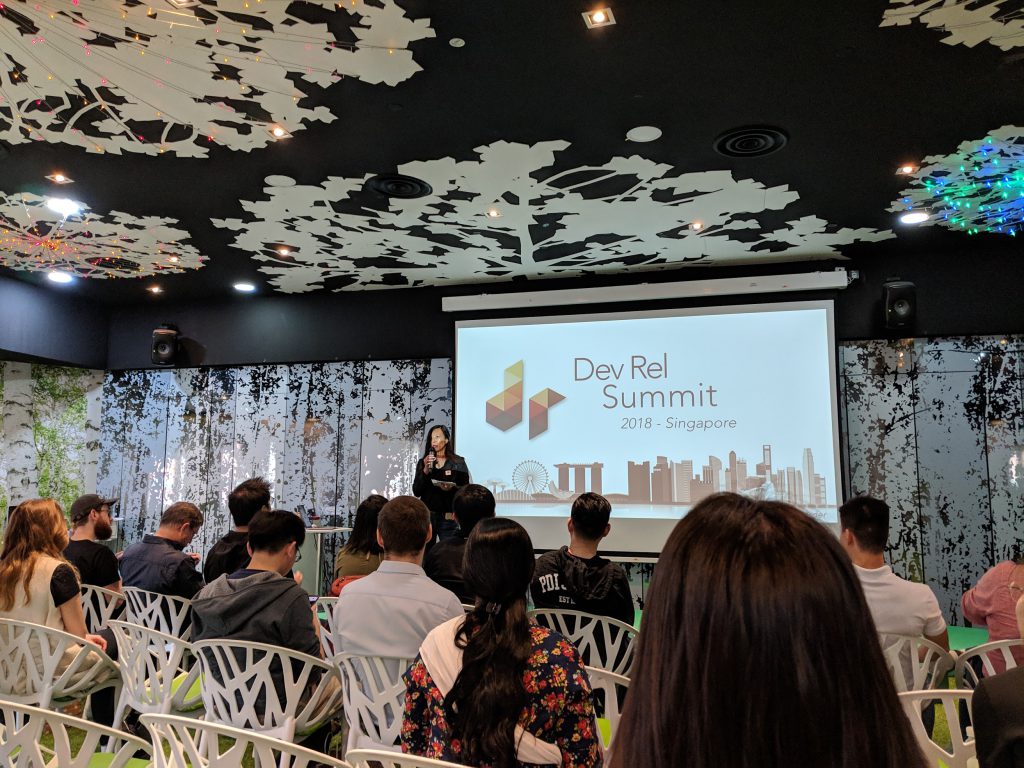Learning about DevRel for the Asian market at DevRelSummit Singapore
Saturday, November 3rd, 2018 at 1:49 pmI’m in the lounge of the Singapore Airport waiting for my flight. Yesterday I spent the whole day at DevRel Summit in a fancy event space listening to peers and colleagues how they tackle the task of reaching out to developers in the Asian market.
I didn’t have any speaking slot at this event, so I took the time to take a lot of photos and take lots of live notes of the event
I was very happy to be able to help out with a workshop for the leadership of the Asian Women Who Code chapter, giving an “Ask Me Anything” style Q&A in the local Microsoft office.
The things I was asked about the most were:
- How to get invited to present at events. I pointed out that having a good online portfolio with what you can cover, examples of your work and your speaking terms and conditions help a lot. Feel free to fork and change my terms and conditions on GitHub
- How to deal with bad feedback online
- How much to charge for speaking engagements
- How to ensure that more diverse people get a chance to represent your company
Many of the answers I gave sparked a constructive discussion amongst the directors of Women Who Code and resulted in answers presented at the closing panel of the DevRel summit.
I look forward to working more on this.
The summit was organized by the same people who run the DevRelSummit in Seattle, Barry Munstersteiger and Sandra Persing, together with a local crew and MC. It was held in a hotel in Clarke Quay, an entertainment section of town close to places for the after party and walking distance from my hotel. The event space was good, with excellent catering, good room facilities and excellent WiFi. A few more power outlets and a better sound system would have been beneficial, but the ample space to sit down and have conversations made up for it.

Some talk feedback
- Jarod Reyes of Twilio did a really good job talking about reaching Dark Matter Developers, aka the ones not publicly visible (a term coined by Scott Hanselman) showing how Twilio found out more about their developers by doing in-depth research and surveys on what they are and altering their outreach and materials accordingly. It is also interesting to see that Twilio has a defined content creation program that offers money per article to people who want to write for them and give them writing training. They also have an open policy for people to ask for event sponsorship and they have a game you can host, Twilio Quest, that teaches coding and participating in open source.
- Tomomi Imura of Slack explained where developers go to learn based on the Stackoverflow survey and described how to create developer education materials for different types of learners based on the VARK system (which is loosely based on the Honey&Mumford research into learner types). She also gave her insights into how to reach out to developers in Japan with important information how to run events.
- Yohann Totting of Google explained in detail how they localized Google’s devrel model to the Indonesian market based on a government hackathon he organized. In the notes there are some interesting numbers on that.
- Ali Spivak of Mozilla did a great job describing how Mozilla uses a data-driven approach to developer outreach and how they scaled and diversified their speaking engagements by training up community speakers. This is directly based on the work I started when I worked at Mozilla and fun to see how it worked out.
- Keir Whittaker of Shopify had a very detailed talk about how Shopify had a different problem than other DevRel organisations as they reach marketplace owners with a slight developer angle or resellers and not developers. I was impressed with his candidness about what worked and what didn’t
- The closing panel with directors of different Asian countries of Women Who Code was a good insight into how they work differently from country to country
- The biggest win for us according to my agenda of learning more about the Asian market was the talk by Thomas Gorissen, organizer of JSConf Asia who gave a detailed talk about what the developer landscape and company interests are in Singapore
Summary
I had a great time and met a lot of lovely people to follow up with on right now. There is a lot of opportunity in the market in Asia and the differences to what the landscape is like in Europe is a good challenge to tackle. Thank you for the organisers and everyone involved to make this a great event worth the long flight.